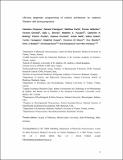Life-long epigenetic programming of cortical architecture by maternal ‘Western’ diet during pregnancy
Abstract
The evolution of human diets led to preferences toward polyunsaturated fatty acid (PUFA) content with ‘Western’ diets enriched in ω-6 PUFAs. Mounting evidence points to ω-6 PUFA excess limiting metabolic and cognitive processes that define longevity in humans. When chosen during pregnancy, ω-6 PUFA-enriched ‘Western’ diets can reprogram maternal bodily metabolism with maternal nutrient supply precipitating the body-wide imprinting of molecular and cellular adaptations at the level of long-range intercellular signaling networks in the unborn fetus. Even though unfavorable neurological outcomes are amongst the most common complications of intrauterine ω-6 PUFA excess, cellular underpinnings of life-long modifications to brain architecture remain unknown. Here, we show that nutritional ω-6 PUFA-derived endocannabinoids desensitize CB1 cannabinoid receptors, thus inducing epigenetic repression of transcriptional regulatory networks controlling neuronal differentiation. We found that cortical neurons lose their positional identity and axonal selectivity when mouse fetuses are exposed to excess ω-6 PUFAs in utero. Conversion of ω-6 PUFAs into endocannabinoids disrupted the temporal precision of signaling at neuronal CB1 cannabinoid receptors, chiefly deregulating Stat3-dependent transcriptional cascades otherwise required to execute neuronal differentiation programs. Global proteomics identified the immunoglobulin family of cell adhesion molecules (IgCAMs) as direct substrates, with DNA methylation and chromatin accessibility profiling uncovering epigenetic reprogramming at >1400 sites in neurons after prolonged cannabinoid exposure. We found anxiety and depression-like behavioral traits to manifest in adult offspring, which is consistent with genetic models of reduced IgCAM expression, to suggest causality for cortical wiring defects. Overall, our data uncover a regulatory mechanism whose disruption by maternal food choices could limit an offspring’s brain function for life.
Citation
Cinquina , V , Calvigioni , D , Farlik , M , Halbritter , F , Fife-Gernedl , V , Shirran , S L , Fuszard , M A , Botting , C H , Poullet , P , Piscitelli , F , Máte , Z , Szabo , G , Yanagawa , Y , Kasper , S , Di Marzo , V , Mackie , K , McBain , C , Bock , C , Keimpema , E & Harkany , T 2019 , ' Life-long epigenetic programming of cortical architecture by maternal ‘Western’ diet during pregnancy ' , Molecular Psychiatry . https://doi.org/10.1038/s41380-019-0580-4
Publication
Molecular Psychiatry
Status
Peer reviewed
ISSN
1359-4184Type
Journal article
Description
Funding: European Research Council (SECRET-CELLS, ERC-2015-AdG-695136; T.H.); Wellcome Trust grant number 094476/Z/10/Z, which funded the purchase of the TripleTOF 5600 mass spectrometer at the BSRC Mass Spectrometry and Proteomics Facility, University of St. Andrews.Collections
Items in the St Andrews Research Repository are protected by copyright, with all rights reserved, unless otherwise indicated.

